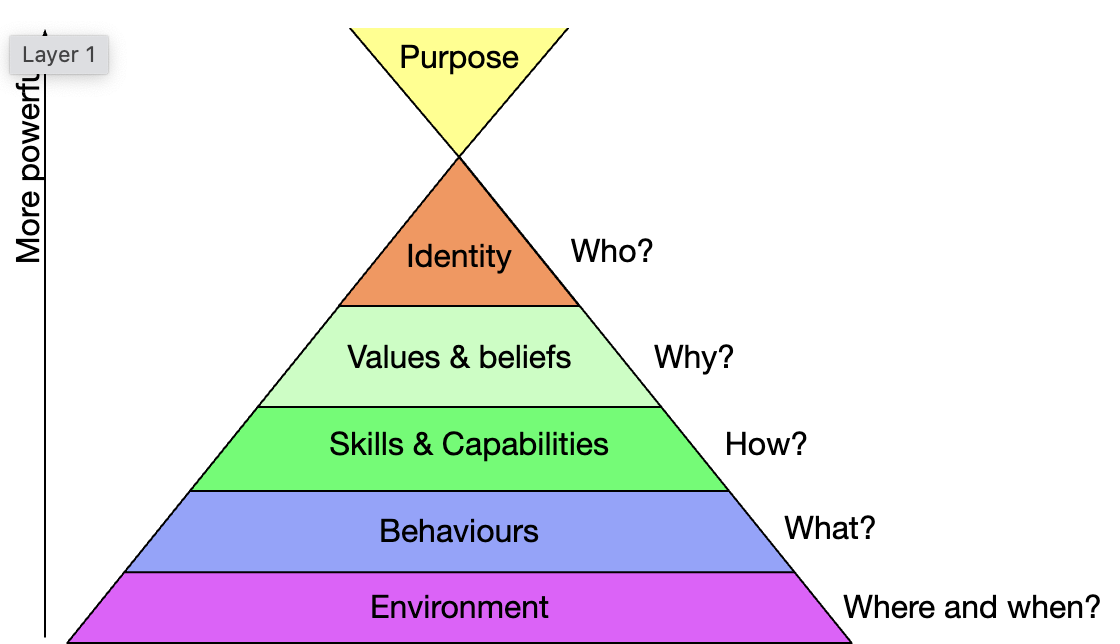1
R. Dilt's logical levels of change
R. Dilt's logical levels of change
Content
Robert Dilts’ Logical Levels of Change provide a structured way for youth trainers to reflect on and understand their development needs.
The model distinguishes six levels—Environment, Behaviour, Capabilities, Beliefs/Values, Identity, and Purpose—each influencing the others. For trainers, this helps clarify whether a challenge lies in external conditions (e.g. lack of resources), skills (e.g. facilitation methods), mindset (e.g. belief in one’s ability), or deeper aspects like professional identity or purpose in youth work.

Source: https://unconsciousagile.com/2023/05/27/logical-levels.html
Using the model, trainers can:
Reflect systematically.
Start from the bottom level (Environment) and move upward, asking targeted questions:
1. Environment – Where? When?
In what kinds of environments do I feel most supported or challenged as a trainer?
What external conditions might I need to change or adapt to feel more effective in my work?
2. Behaviour – What?
Which of my actions during training sessions seem to be effective, and which raise doubts or concerns?
What behaviours or habits might be limiting the quality of my work with participants?
3. Capabilities – How?
In what areas do I feel confident, and where do I notice a need for new methods, tools, or knowledge?
What situations make me feel unprepared or uncertain about my skills?
4. Beliefs and Values – Why?
What personal beliefs support or conflict with the way I approach youth work training?
Are there values I hold that are sometimes in tension with the reality of my practice?
5. Identity – Who?
What aspects of my professional identity do I feel are growing, and which feel unclear or under question?
Do I experience any dilemmas about who I am or who I want to become as a youth trainer?
6. Purpose / Mission – For what? For whom?
When do I feel most connected to the purpose of my work, and when do I question its broader meaning?
What bigger questions am I asking myself about the impact and direction of my role in the youth field?
You can identify gaps and priorities.
By sorting their needs according to these levels, trainers can see whether a training course, mentorship, mindset shift, or deeper career alignment is needed.
You can express needs clearly.
This structure allows trainers to communicate needs with clarity. For instance, “I need to learn better to handle stressful situations” (Capabilities) or “I feel uncertain whether I belong in this field” (Identity).
You can use these levels also in other parts of the training. You can assess your training sessions and identify on which level do you aks participants to operate. Also, you can ask participants to evaluate the course and their learning based on these levels.
Watch the video below with every level explained in a detailed way.
Now share your needs and which Dilt's logical level of change are they related and get a Needs Analyser badge!
Pridobite značko aktivnosti
Needs Analyser Pridobi to značko
This badge shows an understanding of a theoretical framework for change and development, introduced by Robert Dilts, called logical (or neurological) levels of change. Owner of this badge reflected on the learning needs and levels of change.
This badge and online acticity was created during the "Trainers Gathering" as part of the NGO AWERO Erasmus+ accreditation programme aiming to increase competences of trainers in the field of youth.
Programme is co-funded by the Erasmus+ programme.
Naloge
Naloga št.1
Dokaze preveril: En organizator dejavnosti
Reflect on your learning needs based on the R.Dilts logical levels of change and share your needs here. it will be reviewed by one facilitator of the Trainers Gathering event.
Veščine
ETS-TR
#Addresses learners’ needs through an adequate and tailored educational approach
Facilitating learning processes
Na seznam predvajanja dodan/a (0)
Potreben čas za dokončanje: 30 minuta
Deli:
Organizatorji
Awero
Badge issuer recognized with
Preklopite na drug jezik:

